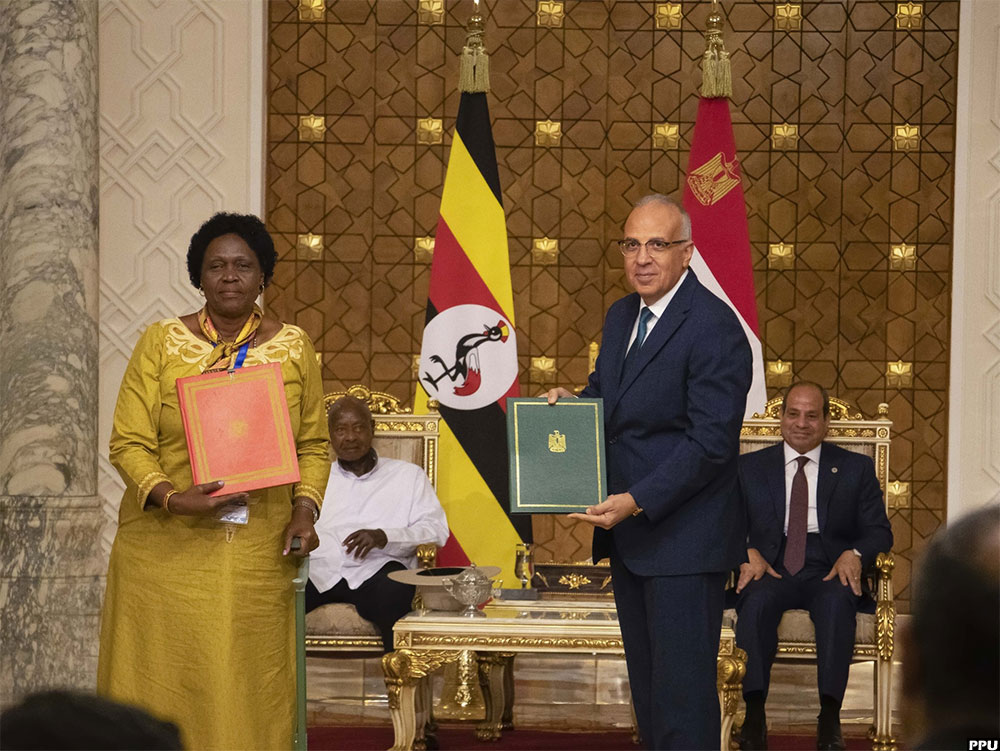Uganda, Egypt agree on strategic partnership for River Nile and trade
In Cairo, Uganda and Egypt sign a series of landmark MOUs covering key sectors from trade and investment to agriculture, water management, and community development.
Uganda's President Yoweri Kaguta Museveni (left) and his Egyptian counterpart, Abdel Fattah El-Sisi, shake hands during their meeting in Cairo, Egypt on August 12, 2025. (Credit: PPU)
By Admin .
Journalists @New Vision
DIPLOMACY
Uganda's President Yoweri Kaguta Museveni and his Egyptian counterpart, Abdel Fattah El-Sisi, have pledged to deepen the Uganda-Egypt ties, anchored by the River Nile and strengthened through decades of Pan-African solidarity.
The two leaders made the revelation Tuesday (August 12) during a joint press conference in the Egyptian capital Cairo on the second day of Museveni’s three-day working visit at the invitation of El-Sisi.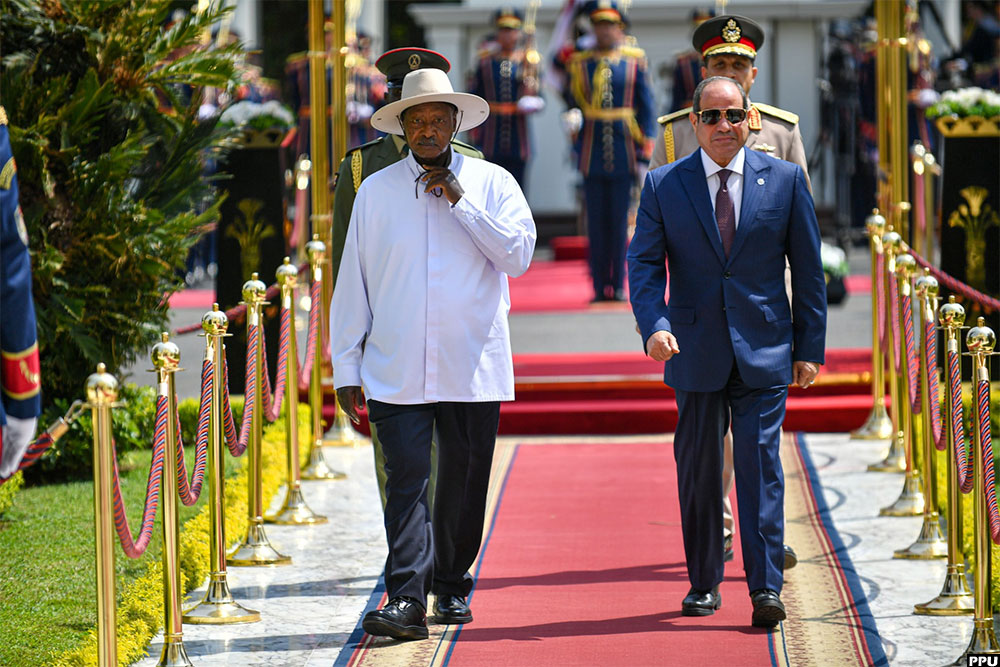
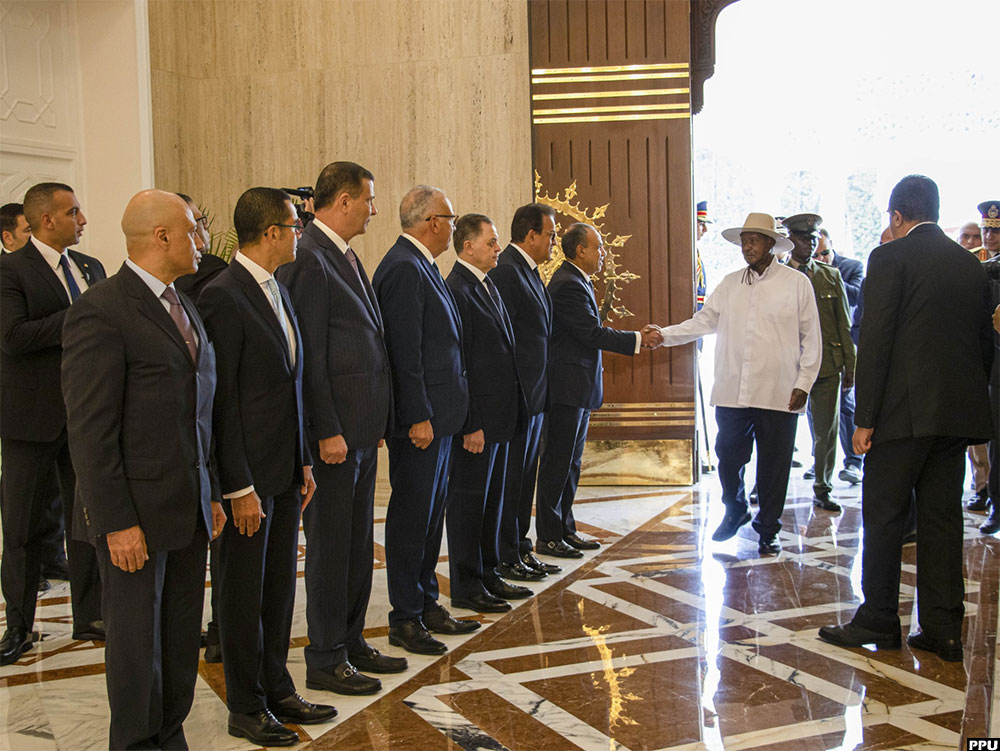
The Ugandan leader began by recalling the deep historical linkages between the two nations, both geographical and political.
“Uganda and the Great Lakes region are linked to Egypt by the Nile from ancient times. Politically, our closeness began in 1952 when President [Gamal Abdel] Nasser took leadership here. Before that, we had little contact, but Nasser, as an Africanist, worked closely with our leaders, Julius Nyerere, Kwame Nkrumah, and supported the anti-colonial movement,” said Museveni.
“When we came into government, we started working with the leaders at that time.”
The visiting President stressed that the future of the Nile must be approached with a wider vision.
“Sometimes, the problem is the approach. Instead of limiting ourselves to historical rights, we should focus on the global needs of all Nile Basin countries,” he said.
“Prosperity for all, electricity for all, irrigation for all, and clean drinking water for all. If we include these in our framework, we can then use the most scientific and fair methods to achieve them."
Museveni also challenged the perception that Uganda is landlocked, saying its natural connection to the Mediterranean through the Nile has only been hindered by political instability in Sudan.
“If there were no problems in Sudan, we would not be called landlocked. We are connected to Egypt because of the Nile.”
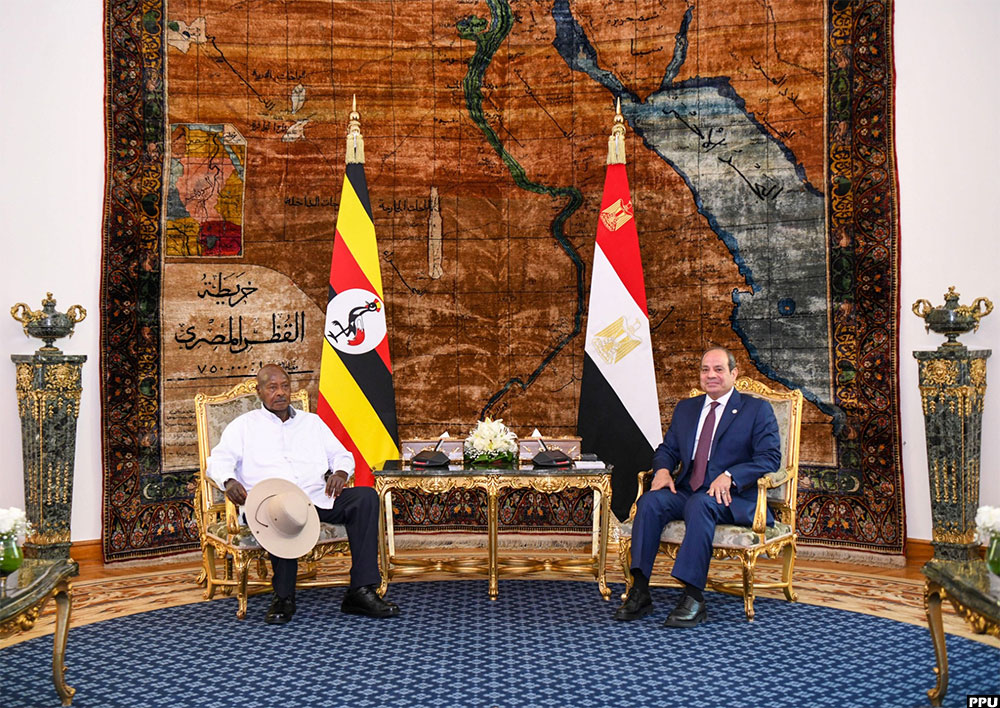
On bilateral cooperation, the Ugandan leader praised Egypt’s support in supplying Uganda with foot-and-mouth disease vaccines and welcomed the decision to establish a vaccine factory in Uganda.
“I am very happy about that,” he said, adding that economic co-operation should be at the heart of Africa’s progress.
“Business is about two things: producing a good or service, and someone buying it. If leaders don’t understand this, there can be no prosperity. If you buy what I produce, you are supporting me, and vice versa. That’s why I am glad His Excellency is emphasizing business. Together, we will see how to produce, trade, create jobs, and develop electricity and irrigation for our people."
Museveni further warned against Africa’s overdependence on trade with Europe.
“Some African countries made the mistake of focusing on trading only with Europe, but that’s risky; they can block you at any time. Why can’t we trade more among ourselves?"
The two presidents also discussed regional challenges, including the situations in Libya, Sudan, and Palestine, with Museveni emphasizing the need for dialogue and peace.
'Nile is life for us'
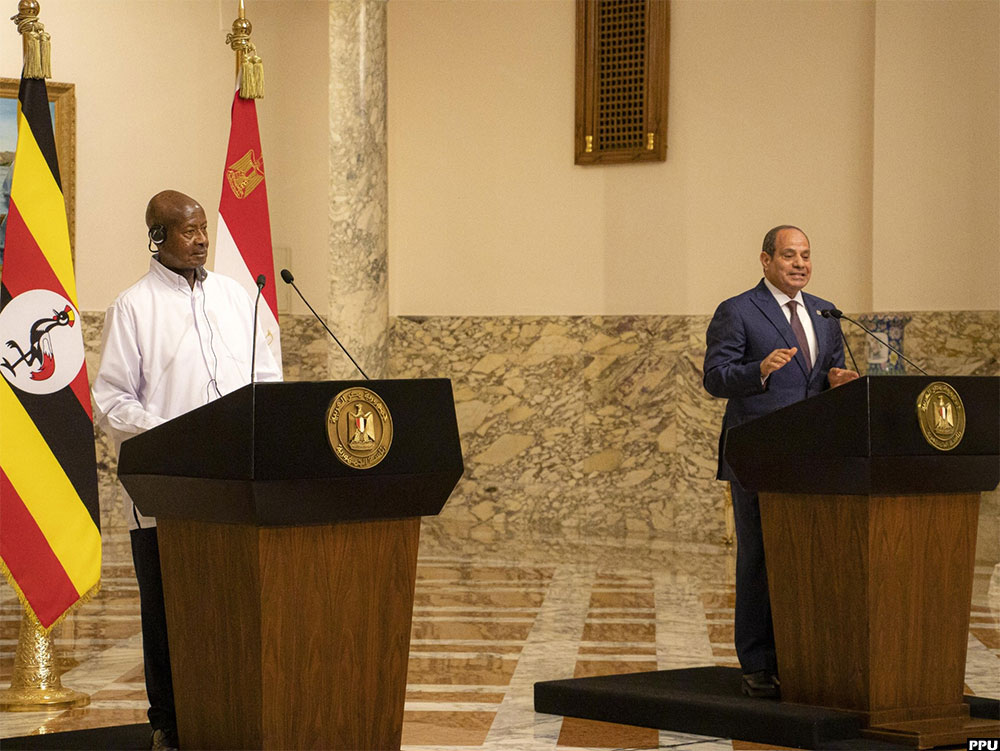
President El-Sisi, in his remarks, underscored the Nile River’s central role in the shared destiny of Egypt and Uganda.
“The Nile binds us together. The bilateral ties between our two countries have recently witnessed growing co-operation, and I look forward to more partnerships,” he said, further highlighting co-operation in water resource management, agriculture, veterinary disease control, natural resource development, and the energy sector.
El-Sisi said Egypt will always uphold international law to protect the Nile while supporting the development of other Basin countries.
“Egypt has no other water source; we don’t have rainfall. The Nile is life for us. We are not against development in any Basin country, but we call for equitable sharing of water resources. We must coexist and ensure that development does not harm the people who depend entirely on this river,” he said.
The Nile annually carries more than 160 billion cubic metres of water, with 85 billion cubic metres coming from the Blue Nile, much of which is used for agriculture.
“This is why water is extremely critical for Egypt. Our people are deeply concerned about it, and we trust Uganda’s role in fostering agreements among Basin countries,” said the Egyptian leader.
He closed by expressing gratitude to his Ugandan counterpart. “I thank President Museveni and welcome him to Egypt. Our discussions have demonstrated great understanding and a shared vision for the future.”
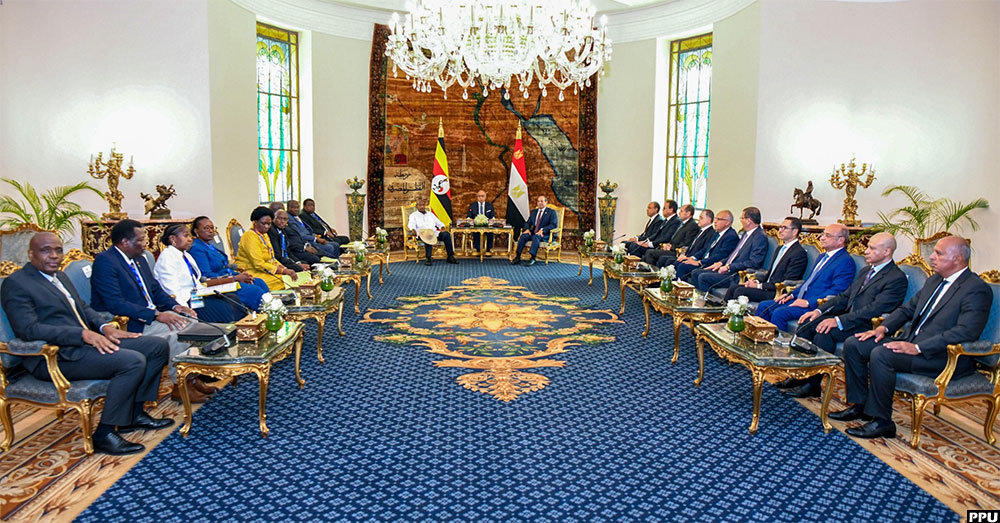
Meanwhile, earlier on, a series of landmark memoranda of understanding (MOUs) covering key sectors from trade and investment to agriculture, water management, and community development were signed.
Presiding over the event, the two heads of state watched their respective ministers append their signatures, committing their nations to closer cooperation.
Uganda’s internal affairs minister Maj. Gen. (Rtd) Kahinda Otafiire signed the first agreement with Egypt’s foreign affairs minister Dr Badr Abdelatty, paving the way for stronger collaboration in governance, security, and diplomatic engagement.
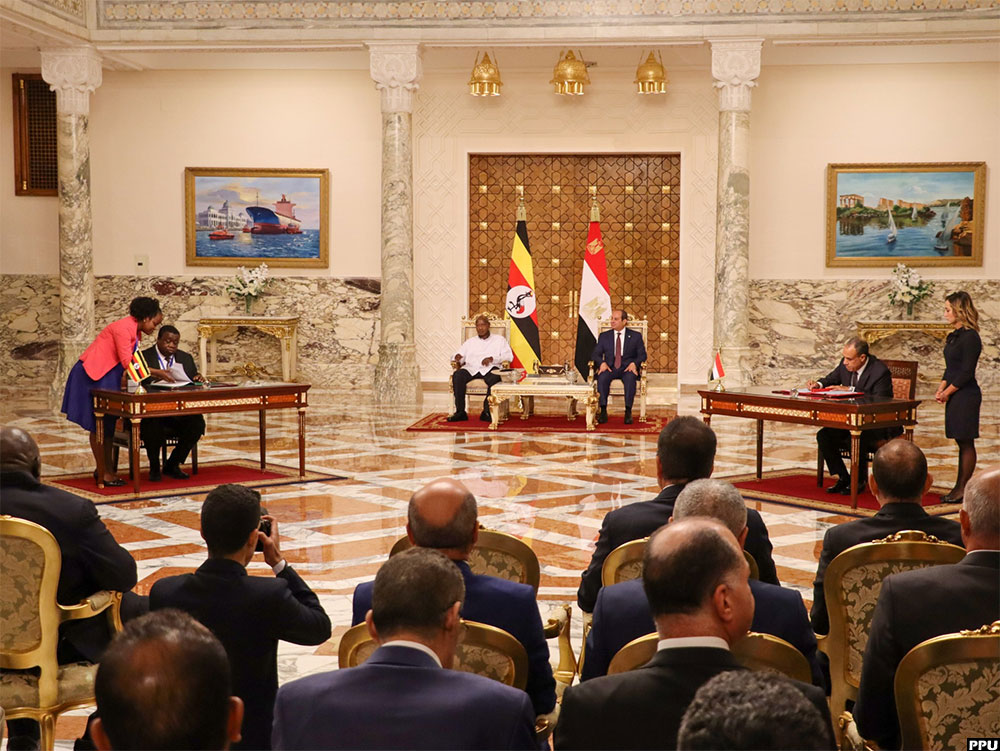
This was followed by the signing of a foreign affairs co-operation framework between Uganda’s foreign affairs state minister Henry Okello Oryem and Dr. Abdelatty, aimed at strengthening political dialogue and regional coordination.
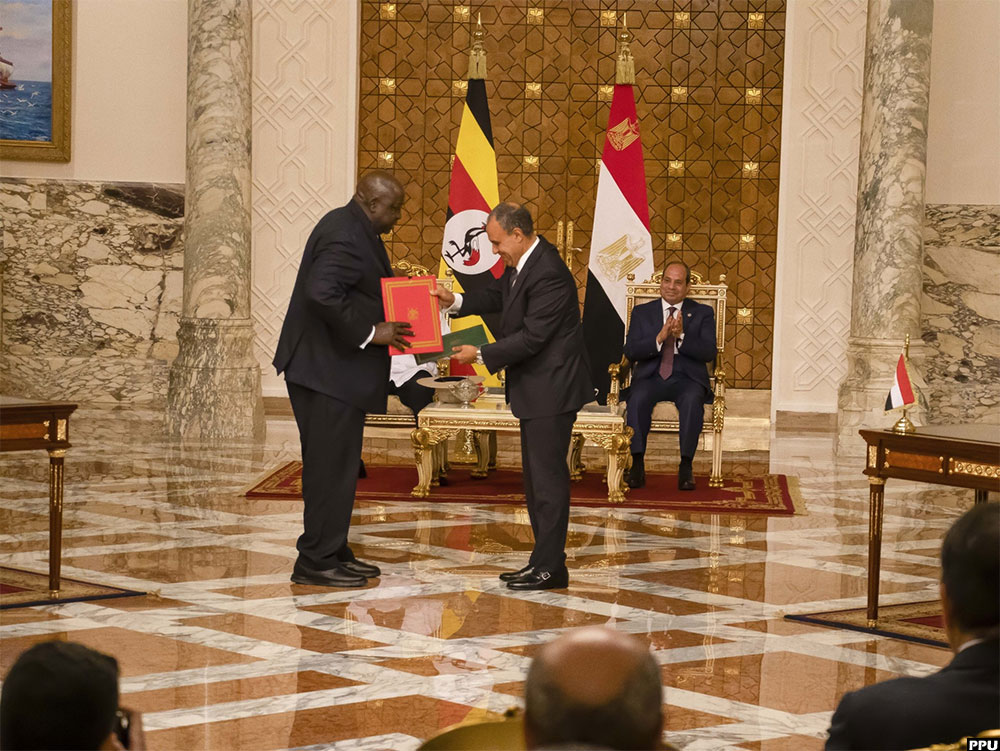
The spirit of collaboration extended to rural transformation and agriculture, with Uganda's Luwero Triangle and Rwenzori region state minister Alice Kaboyo joining hands with Egypt’s Minister of Agriculture and Land Reclamation, Alaa Farouk, to formalize partnerships in agricultural technology transfer, land reclamation, and community development projects.
Economic growth took centrestage as Uganda’s finance minister Matia Kasaija, and Egypt’s Minister of Investment and Foreign Trade, Hassan El Khatib, signed an agreement to promote trade, investment, and joint ventures, promising to unlock new opportunities for business communities in both nations.
Water security and environmental sustainability were also high on the agenda, where Uganda's water and environment state minister Beatrice Anywar signed with Prof. Dr. Hani Sewilam, Egypt’s Minister of Water Resources and Irrigation, cementing co-operation in water resource management, irrigation development, and environmental protection.
